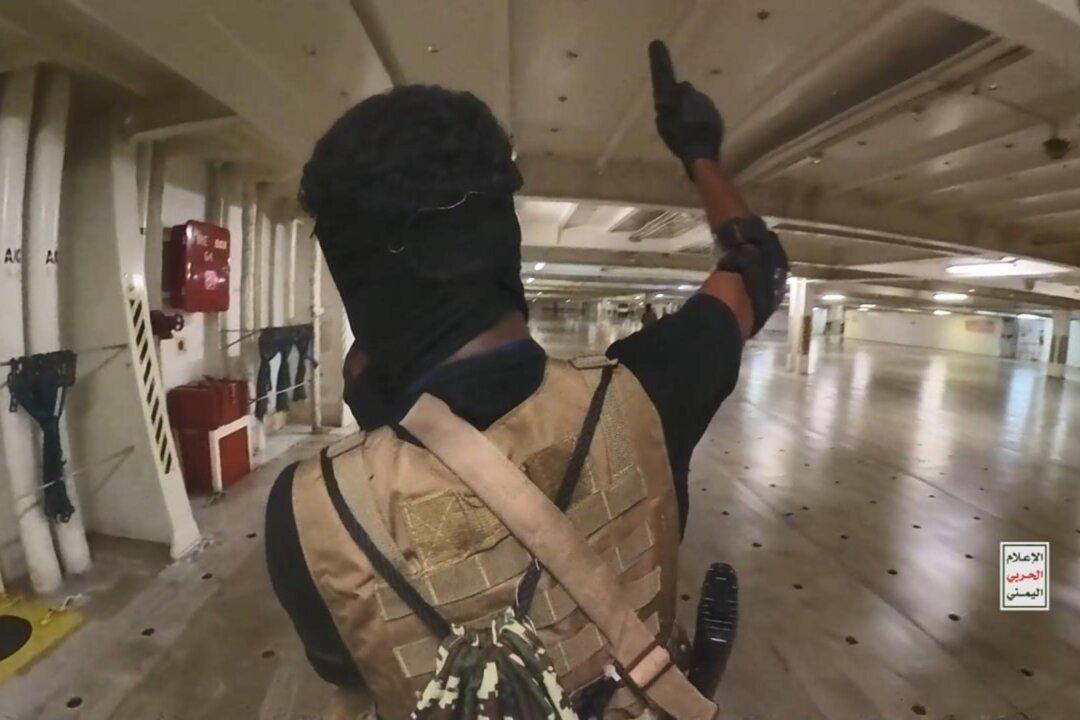Commentary
The Houthi flag includes the words “Death to America, Death to Israel, curse the Jews, and victory to Islam.” That’s all we need to know to want to defeat them and their supporters—with their own money. It should come as no surprise that they use Chinese military technology, are inspired by the Al-Qaeda terrorist Osama bin Laden, and get direct military support from Iran.
To aid Hamas’s war against Israel, the Houthis have attacked over a dozen ships so far, including at least one U.S. Navy ship, Saudi oil tankers, and Norwegian and Liberian ships. To this end, the Houthis let loose approximately 100 munitions, including drones and missiles, against international shipping in the Red Sea. They seized one commercial ship and 25 crew members, who are still held hostage in Yemen.
The Houthis initially targeted Israel-linked shipping but have now apparently broadened their target set to any shipping within range. Malaysia, unfortunately, supports another Iranian proxy, Hamas, and also bans Israel-linked shipping from docking in Malaysian ports. Houthi ballistic missile targets have included the Israeli port of Eilat, with the result that shipments through it declined by 85 percent.
While the Trump administration officially designated the Houthis as terrorists, the Biden administration rescinded the designation and has not retaliated against Houthi targets in Yemen, apparently for fear of provoking Iran. The Biden administration has been slow to hit Iran financially as well, with too-little-too-late Treasury Department sanctions imposed on just a few Yemeni and Turkish financial targets on Dec. 28.
As a result, Iran and the Houthis are largely accountable and on the attack even as the United States attempts peace talks that would legitimize Houthi control of territory, including most of Yemen’s mineral wealth, maritime trade access, and air links to Iran and Lebanon where they could more easily get assistance from a third Iranian proxy and strong supporter, Hezbollah.
Recent Houthi attacks utilized Iranian intelligence and munitions imported from Iran, including drones, rockets, cruise missiles, and ballistic missiles. Over the years, the Houthis attacked not only Israel but also UAE and Saudi targets with tens of thousands of rockets, killing over 100 Saudi civilians, depopulating hundreds of Saudi villages, and capturing scarce Saudi farmland, still not returned.
Iran and Russia benefit from the higher energy prices that come with Houthi attacks. According to a Western military official who spoke to the Middle East Eye, “The Iranian Revolutionary Guard are in Yemen in force. The sophisticated Houthi targeting would indicate close guidance.”
In Yemen, the Houthis kill women’s rights activists, booby-trap children’s toys, force villagers and children into becoming terrorists, and hide terrorists among civilians. Over 375,000 already died in recent Yemeni wars, mostly from lack of food, water, and healthcare. Ultimately, the Houthis and their partners in Iran and Lebanon are responsible. The Iranian “axis of resistance” that includes various terrorists and militias—including the Houthis, Hamas, Hezbollah, and pro-Iran militias in Syria and Iraq—effectively joins the “axis of evil” countries, including China, Russia, and North Korea.
Iran exports munitions to the Houthis for as little as $1,000 each. To shoot them down in flight requires sophisticated U.S. missiles that cost as much as $2 million to $11 million each, not to mention the fixed cost of naval ships to carry them. The United States has already shot dozens of these missiles to defend Red Sea shipping from the Houthis, and more such costs are expected.
The United States announced on Dec. 19 that it is leading a naval task force—called Operation Prosperity Guardian—to protect shipping in the Red Sea. Over 20 countries are involved, with 12 named but only a few sending ships, including the United States, Britain, Denmark, France, and Greece. This will spread out the costs, but can still be exploited by Tehran.
Also under discussion are U.S. and allied land attacks on Houthi targets in Yemen, including missile sites, command-and-control, radar, and weapons depots. Ports and airfields, through which the Houthis might import more weapons, could be attacked, as well as targeting Iranian munitions factories, including for drones, missiles, and nuclear weapons. These offensive approaches will increase the cost to the terrorists beyond that of allied costs, which is necessary to end the war. Yet it still costs the U.S. taxpayer when the U.S. taxpayer is not at fault.
American taxpayers who supply security to international shipping in the Red Sea should be fully reimbursed through immediate reparations from Iran, Hezbollah, and the Houthis, with seizures of Iranian and other assets, including shipping, as the result of a failure to pay. This approach, if it does not yield full payment, could be augmented by taxes on all Red Sea shipping, payable in U.S. and allied currencies and remitted in proportion to costs incurred to the United States and those allies participating in the operation.
When it comes to Iran and its terrorist proxies, offense is the best defense. It is time for the United States and allies to get properly compensated for not pulling our punches. All else invites further attacks.





